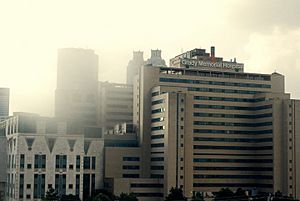Grady Memorial Hospital facts for kids
Quick facts for kids Grady Memorial Hospital |
|
|---|---|
 |
|
 |
|
| Geography | |
| Location | Atlanta, Georgia, United States |
| Coordinates | 33°45′08″N 84°22′57″W / 33.752221°N 84.382392°W |
| Organization | |
| Care system | Public |
| Hospital type | General |
| Affiliated university | Emory University School of Medicine Morehouse School of Medicine |
| Services | |
| Emergency department | Level I trauma center |
| Beds | 989 |
| History | |
| Founded | 1892 |
Grady Memorial Hospital is the public hospital for the city of Atlanta. The hospital is ranked as the tenth largest public hospital in the United States and is a Level I trauma center
History
Grady Memorial Hospital was founded in 1890 and opened in 1892, as an outgrowth of the Atlanta Benevolent Home. It is named for Henry W. Grady, an Atlanta Constitution journalist and later owner who became a major force in Georgia politics and advocated for a public city hospital. At the time of opening, the hospital officially had 14 rooms. The original building (at the corner of Jesse Hill Jr Dr SE and Coca-Cola Place) is now on the National Register of Historic Places and is known as Georgia Hall, where the hospital's human resources staff now work. The second Grady Hospital (at Butler Hall) opened in 1912 and was for whites only, with blacks being segregated at the Atlanta Medical College. The third hospital was at Hirsch Hall and the current location is its fourth. From 1945 until 2008, the hospital was run by the Fulton/DeKalb Hospital Authority.
The current facility was also built as a segregated institution, with one section serving whites (Wings A & B; facing the city) and another section serving African Americans (Wings C & D; facing the opposite direction). Even though it is a single building, and the two sides are connected by a hallway (Wing E), the facility was referred to in the plural ("The Gradys") during the years of segregation.
In 2007 and 2008, journalist Mike King of the Atlanta Journal-Constitution wrote a series of "Saving Grady" editorials – dozens of pieces over eighteen months – during the time when Grady Memorial Hospital was nearly insolvent and in danger of closing.
Infant abductions
Seven infants were abducted from Grady from 1978 to 1996, which was more than from any other hospital in the United States during that time period. Five were recovered within hours or weeks of their abduction. An additional child was abducted from the home of his mother after the kidnapper followed her from Grady. The abductions were covered on season three of the podcast The Fall Line.
Problems and restructuring
The hospital board has long been reluctant to make money-saving changes that might reduce its traditional mission. In late 2006, it rejected the advice of financial consultants and its newly hired chief executive to close an expensive outpatient dialysis clinic for the poor, being concerned that many of the clinic's uninsured patients, including many undocumented immigrants, would have nowhere else to turn. Others argued that the board of directors is politically clumsy and prone to micromanagement. In May the board's own consultants concluded that "Grady does not currently have the depth of leadership" necessary to transform the hospital.
In 2008, Grady Memorial Hospital was made into a non-profit organization. Numerous foundations have pledged hundreds of millions of dollars to revitalize it. Michael Young has become a chief executive officer. He was formerly the CEO of Erie County Medical Center Corp. in Western New York, University of Buffalo tertiary center. Prior to that, Young served for 16 years as president and CEO of the three-hospital, 530-bed Lancaster General Hospital & Health System in Lancaster, Pennsylvania.
In February 2013, it was announced that Grady's net profit was $20 million and that 200-300 jobs had been added at the hospital in the preceding 18 months.
2008 tornado
On March 14, 2008, the buildings of Grady sustained minor damage when a tornado tore through downtown Atlanta. Historic Georgia Hall was the hardest hit, with windows blown out, a collapsed chimney, and water damage. The main hospital had a few cafeteria windows blown out, but never lost power. It was the first tornado to hit the downtown area since local weather record-keeping began in the 1880s. Nine people were taken to Grady for treatment, one of whom had critical injuries.
Service
The hospital serves a large proportion of low-income patients and is supported almost entirely by Fulton and DeKalb counties, with little help from the suburbs or state, despite serving all of metro Atlanta's several counties. The hospital relies almost entirely on Emory University School of Medicine and Morehouse School of Medicine to provide doctor and resident staffing. As an editorial in The Atlanta Journal-Constitution said, "When you read the phrase 'Grady doctor,' do a silent translation, because those words really mean either 'Emory doctor' or 'Morehouse doctor.'"
Grady Hospital's ambulance service, Grady EMS, shares 9-1-1 responsibility for Fulton County, Georgia. The Downtown Connector (Interstate 75/85) makes a large bend around the hospital on its otherwise due north–south route, dubbed the "Grady Curve" on traffic reports.
See also
- Kanye West - rapper who was born at Grady.
- Brenda Lee - singer who was born at Grady.
- McKinley Belcher III - actor who was born at Grady.
- Grace Towns Hamilton
- Sanjay Gupta - associate chief of the neurosurgery service, CNN chief medical correspondent
- Tom Price - Former US Secretary of Health and Human Services, who had been a resident at Grady Hospital
- Elizabeth Sharp, nurse and midwife who set up the midwife service at Grady
- Alberta Williams King, mother of Martin Luther King Jr. who died at Grady

